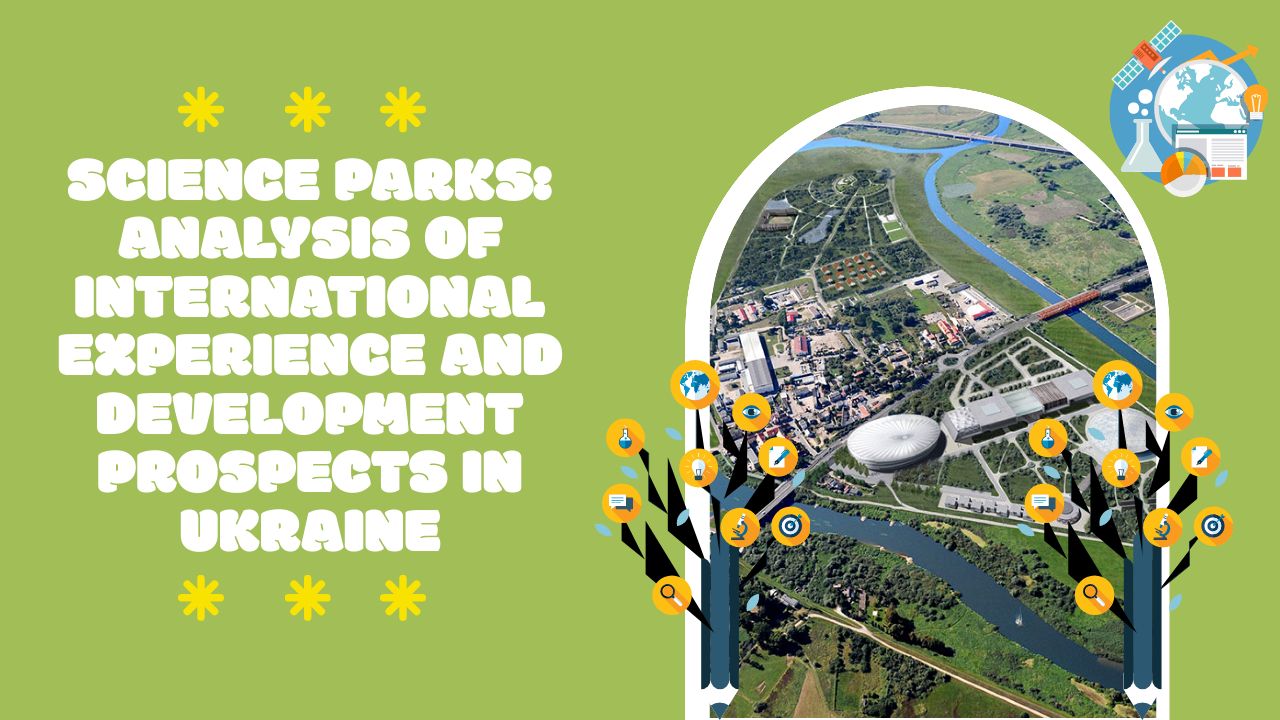Science parks: analysis of international experience and development prospects in Ukraine
DOI:
https://doi.org/10.15587/2706-5448.2024.307743Keywords:
post-war reconstruction of the country, science parks, «Science Quarter», Kharkiv science parkAbstract
The object of the research is the issues related to the creation of science parks in Ukraine at a new level in the process of its post-war reconstruction. In this paper, the main focus is on the analysis of the very concept of «science park» and the experience of some international ones, which are most suitable for the domestic plans for the transformation of the Ukrainian economy and its social infrastructure. Also researched the initiative of the Kharkiv city government to create the so-called «science quarter», which would absorb all the best that exists in the world in the field of science parks, and would have its own «highlight». As a result of this study, it was established that the creation and functioning of science parks is an important component of the modern world economy, which should be given serious attention in the process of post-war transformation of the Ukrainian economy. Moreover, the process of developing a strategy for the construction of such science parks should be started now, without waiting for the end of the war. A good example of this is the start of work on the project to create a science park in Kharkiv called «Science Quarter» as part of the development of a city recovery plan with the help of specialists from various international organizations, universities, banks and funds. The article analyses the activities of some similar science parks in Poland, which can be used as a guide in this process, and provides recommendations for the improvement and enhancement of certain basic elements of the future Kharkiv science park. As a result, it was concluded that thanks to the hard work of the city authorities with the support of international institutions, active work is being done to develop a city reconstruction strategy at a fundamentally new level in Kharkiv, within which a significant place is given to the implementation of the «Science Quarter» project. The success of the latter will depend not only on the experienced team of specialists implementing this project and the receipt of the necessary funding, but also, first of all, on the success of our defenders in repelling russian aggression.
References
- Liashenko, V. I., Zemliankin, A. I., Pidorycheva, I. Yu., Berezhna, T. F. (2012). Perspektyvy rozvytku naukovykh parkiv yak elementiv infrastruktury innovatsiinoho pidpryiemnytstva v Ukraini. Visnyk ekonomichnoi nauky Ukrainy, 1 (21), 89–109.
- Petryshyn, H. P., Solan, S. B. (2013). Naukovi parky: funktsionalno-tekhnichni ta terytorialno-prostorovi napriamy rozvytku. Visnyk Natsionalnoho universytetu «Lvivska politekhnika». Seriia: Arkhitektura, 757, 239–247. Available at: http://nbuv.gov.ua/UJRN/VNULPARX_2013_757_40
- Pidorycheva, I. Yu. (2017). Naukovi parky: svitova praktyka ta realii pravovoho rehuliuvannia yikh diialnosti v Ukraini. Problemy ta perspektyvy rozvytku naukovykh parkiv Ukrainy. Kyiv, 66–71.
- Cherniuk, V. (2016). Naukovi parky v Ukraini – stan ta problemy diialnosti. Teoriia i praktyka intelektualnoi vlasnosti, 1, 68–75.
- Chudaeva, I. B. (2011). Scientific parks: essence, functions and prospects of creation. Naukovyi visnyk NLTU Ukrainy, 21.1, 352–361.
- Pro naukovi parky (2009). Zakon Ukrainy No. 1563-IKh. 25.06.2009. Available at: https://zakon.rada.gov.ua/laws/show/1563-17#Text Last accessed: 11.02.2024
- Liashenko, V., Pidorycheva, I., Buravchenko, S., Stetsenko, O. (2021). Developing Science Parks: Global Experience and Possible Guidelines for the Donbas Region’s Innovative Economic Recovery. Economic Herald of the Donbas, 2 (64), 4–26. doi: https://doi.org/10.12958/1817-3772-2021-2(64)-4-26
- Prysvitla, O. (2022). The role of science parks in the formation of the national innovation system. State and Regions. Series: Economics and Business, 1 (124), 46–49. doi: https://doi.org/10.32840/1814-1161/2022-1-7
- Shulikin, D. (2021). Naukovi parky: chy ne vyiniaty palytsi z kolis? Svit, 33–34. Available at: https://svit.kpi.ua/2021/09/13/%D0%BD%D0%B0%D1%83%D0%BA%D0%BE%D0%B2%D1%96-%D0%BF%D0%B0%D1%80%D0%BA%D0%B8-%D1%87%D0%B8-%D0%BD%D0%B5-%D0%B2%D0%B8%D0%B9%D0%BD%D1%8F%D1%82%D0%B8-%D0%BF%D0%B0%D0%BB%D0%B8%D1%86%D1%96-%D0%B7-%D0%BA%D0%BE/
- Naukovyi kvartal. Kharkiv Investment Agency. Available at: https://kharkivinvest.org/uk/project/science-neighbourhood/ Last accessed: 27.02.2024
- Kulish, P. (2024). Biuro Normana Fostera prezentuvalo plan rozvytku naukovykh parkiv u Kharkovi. Hvara media. Available at: https://gwaramedia.com/biuro-normana-fostera-prezentuvalo-plan-rozvytku-naukovykh-parkiv-u-kharkovi/ Last accessed: 23.02.2024
- Ihor Terekhov proviv onlain-zustrich z fakhivtsiamy komandy Fostera (2024). Ofitsiinyi sait Kharkivskoi miskoi rady, miskoho holovy, vykonavchoho komitetu. Available at: https://www.city.kharkiv.ua/uk/news/igor-terekhov-proviv-onlayn-zustrich-z-fakhivtsyami-komandi-fostera--55380.html Last accessed: 22.02.2024
- «Kharkiv: Restart» – prezentatsiia mista dlia investoriv (2023). Ofitsiinyi sait Kharkivskoi miskoi rady, miskoho holovy, vykonavchoho komitetu. Available at: https://www.city.kharkiv.ua/uk/news/-54670.html Last accessed: 27.02.2024
- Kharkiv IT Cluster zavitav do Ukrainskoi inzhenerno-pedahohichnoi akademii (2024). Ofitsiinyi sait Kharkiv IT Cluster. Available at: https://it-kharkiv.com/kharkiv-it-cluster-zavitav-do-ukrayinskoyi-inzhenerno-pedagogichnoyi-akademiyi/ Last accessed: 08.03.2024

Downloads
Published
How to Cite
Issue
Section
License
Copyright (c) 2024 Viktoriia Prokhorova, Yuliia Us, Boris Yukhnov, Serhii Rudas, Veronika Slastianykova

This work is licensed under a Creative Commons Attribution 4.0 International License.
The consolidation and conditions for the transfer of copyright (identification of authorship) is carried out in the License Agreement. In particular, the authors reserve the right to the authorship of their manuscript and transfer the first publication of this work to the journal under the terms of the Creative Commons CC BY license. At the same time, they have the right to conclude on their own additional agreements concerning the non-exclusive distribution of the work in the form in which it was published by this journal, but provided that the link to the first publication of the article in this journal is preserved.







